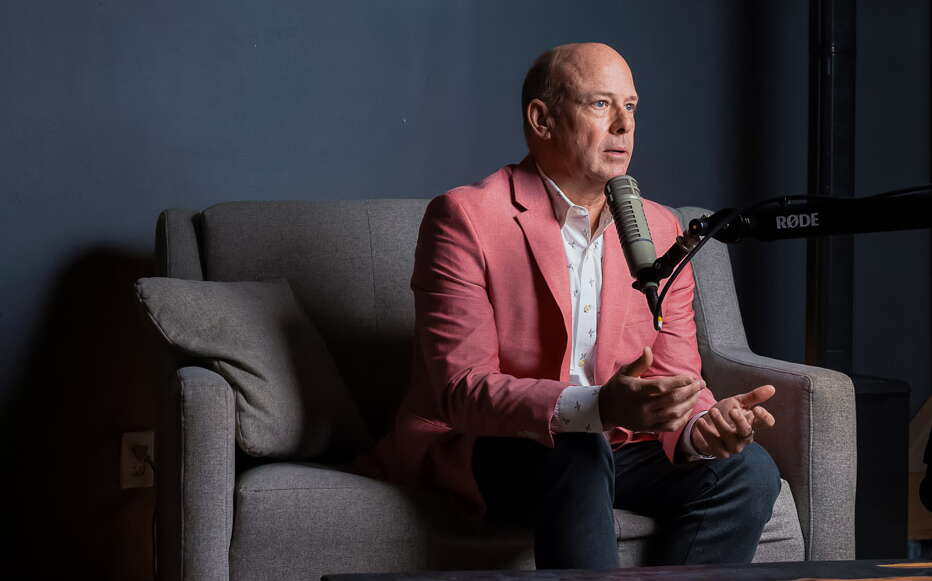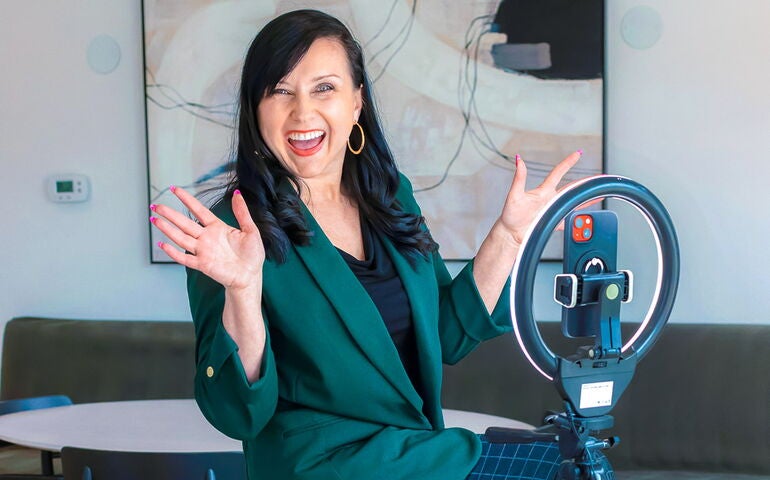
Processing Your Payment
Please do not leave this page until complete. This can take a few moments.
The reel deal: How Maine real estate professionals are using social media to drum up business
 Photo / Tim Greenway
Yulia Glasgow, an associate broker at Maine Real Estate Co., says she likes to show her social media followers that “I’m a big goofball.”
Photo / Tim Greenway
Yulia Glasgow, an associate broker at Maine Real Estate Co., says she likes to show her social media followers that “I’m a big goofball.”
“Tick tick boom,” the hip hop song plays as the black-and-white-clad woman in heels sashays through the grocery aisle, tossing turkey, stuffing mix and produce into her cart for Thanksgiving dinner.
There’s no speaking in the high-energy mini movie, only rapping and a plug for the real estate broker whose name and phone number pops up on a series of checkout dividers. She’s Yulia Glasgow, an associate broker with Scarborough-based Maine Real Estate Co. who spends up to four hours a week on social media marketing.
“I’m a big goofball, and I want people to know this is just my personality,” says Glasgow, a former IT project manager who chooses music that’s trending for her Instagram reels — short videos like the grocery-store one that’s garnered more than 1,850 views.
More serious on LinkedIn, Glasgow aims for fun on Facebook and Instagram, the two top social media networks used in her profession, to show prospective clients that she would be fun to work with: “My dream job is to be Santa Claus, so real estate allows that for me,” she says.
For Glasgow and many of her peers, social media isn’t just a hobby or creative outlet, it’s an essential tool to stand out and generate leads in a competitive industry. Whether they’re posting new listings or closings or more personal things like snapshots of pets, babies and vacations, real estate agents in Maine and elsewhere are using social media to promote their brand, stay connected to clients and find new ones, and keep tabs on trends and what their peers — and rivals — are up to.
“I started this work 37 years ago when we relied solely on the newspapers,” says Boulos Co. broker and partner Craig Young, who is also president of the Maine Real Estate and Development Association and hosts the “MEREDA Matters” podcast that’s promoted on multiple social media platforms. Today, “you can’t be in the business and not utilize Instagram.”

Generating business leads
While Young can’t say for sure whether he’s ever gotten a lead from a post on Instagram or Facebook, Cady Toussaint of Portside Real Estate Group in Portland says she gets 100% of her business from social media.
“I’ve sold plenty of properties specifically from my Instagram account,” the residential broker says.
That includes a three-bedroom, three-bathroom farmhouse house in Gray along the Collier Brook that Toussaint sold to a couple from Germany who liked what they saw on her walk-through reel. After dispatching their agent to view the property and dial them in via FaceTime, the duo proceeded with an offer and only visited the house for the first time during the final walk-through, Toussaint says. The sale closed in December for $772,200, according to Zillow.
Video walk-throughs are a staple for Toussaint, who has a marketing degree and works with Windham-based Structure Media on production. With every home walk-through video, including those with virtual staging, the goal is to help potential buyers visualize themselves living there.
After her videos go out, Toussaint studies data on where her viewers are coming from—grouped by hashtags, age demographics and location — to make the next production even better. “Every time I post a video I set personal goals,” she says. “I am data obsessed.”
So is residential broker Bailey Pate, owner of Maine Real Estate Co. in Scarborough, who mainly uses Instagram and Facebook though also has YouTube and TikTok accounts.
“The biggest way I get leads is from consistently posting on social media with a call to action,” she says, “whether that is having people DM me or leading them to my website. Instead of cold-calling or knocking on doors, people will literally reach out to me and ask for my help.”

Pate, who leads a 35-strong team of residential and commercial brokers, spends about an hour a week on social media, where she posts stylized photos and videos showing a glimpse into her personal life and the properties she is showcasing — always playing a starring role so that viewers remember the name when they’re ready to do business.
“I want to be the first person they think of without shoving real estate down their throat,” says Pate. For others in the industry keen to do the same, she created an online pre-recorded course last year called “Social Media for Agents,” which costs $397 for 25 lessons, or two installments of $210 each for those that prefer.
To camera-shy social media newbies who don’t like the way they look or sound, Pate offers the reassurance that “people are following your page because they like you and want to get to know you more.” She also says the effort is worth it, although it may take around six months to start closing deals that come out of social media connections.
“You’re not going to get results right away,” she underscores. “But don’t give up.”
Elsewhere in the residential world, Rachel Davey of Vitalius Real Estate Group says that while she finds social media useful for her business, she doesn’t see it as a requirement for everyone, saying, “I don’t think it’s a must, I think it’s a tool in our toolbox.”
Samantha Marinko, a commercial real estate associate broker at Boulos, uses the tool — mainly Instagram — to stay engaged with clients by publicizing their events or reposting their content.
“I try to follow all of my clients on social,” she says. “It’s a great way to stay in touch.”
Social media landscape, caveats
Social media’s value to the real estate world is reflected in a report published in January by the National Association of Realtors, based on survey responses from 2,632 of its members.
Among technology tools that have generated the highest number of quality leads for respondents in the last 12 months, social media was No. 1 (54%), followed by customer relationship management software (36%) and the local multiple listing service (24%).
Two-thirds said they use social media mainly to promote listings and build client relationships, while only 28% cited enjoyment as the main reason.
Facebook, used by 92% of respondents, is by far the most popular platform for real estate, followed by Instagram, LinkedIn and YouTube — as has been the case for the past three years, according to Brandi Snowden, NAR’s director of member and consumer survey research.
Among U.S. adults as a whole, YouTube and Facebook are by far the most used online platforms, followed by Instagram in the No. 3 spot, according to a January report by the Pew Research Center. It shows that 68% use Facebook, close to half use Instagram and a third now hop onto Tiktok, up from 21% in 2021.
Realtors “are aware of who their ideal customer is, and what platforms they’re on,” says Rich Brooks, president of flyte new media, a web design and digital marketing agency in Portland. “With Facebook and Instagram you’re going to reach a wider audience, and your ideal customer for real estate is also on those platforms.”
His suggestion for brokers who make use of social media is to go in with a plan because of the changing landscape, including a possible U.S. ban of TikTok, the Chinese-owned video platform.
“TikTok might go away in America, and Facebook’s business model is not your business models” he cautions. “These are networking parties you’re showing up to, but you have no control over them.”
Jesse Fowler, owner of OSC Web Design in Scarborough, urges those working in real estate to have their own website and social media and not just via their employer.
“A lot of companies give you a website so if you leave the company, that’s gone,” he says.
“It’s all about building the personal brand.”
Branding with ‘Billy’

For Chris Davis of Places in Maine Real Estate Group, part of the nationwide, publicly traded Real Brokerage Inc. (Nasdaq: REAX), social media branding is a daily activity. He’s active on multiple platforms, using Instagram to show what he’s up to all day from working out to showing properties across the state.
“I cannot sleep if I do not have an active story,” photos and videos displayed to his 3,000-plus followers for 24 hours, he says. “We’re working hard to build trust with our audience, and we do that by showing our lives and doing that authentically.” That often brings in new clients, like a family from Vermont he helped close on a house in Kennebunkport six months ago.
“The husband said, ‘I found you on Instagram. It looks like you eat and sleep real estate, and that’s what we want.’”
Working in real estate since 2019, Davis is a trained actor who puts his thespian skills to use for the videos he posts on social media; like Portside’s Toussaint, he also hosts episodes from Maine for the “American Dream TV” lifestyle and real estate show aired on cable networks.
For his own social media, Davis has created a comedy series featuring himself and a fictional client he portrays named Billy.
In one episode, Billy — a cheeky, over-confident, self-described graduate of Instagram University living in an RV — asks his real estate agent about getting free land on which to start a cult.

Davis, who plays both characters, says Billy is meant to portray “the most ludicrous buyer in the world,” and says his followers are mostly other brokers. Each of the six videos recorded so far has gotten between 1,500 and 3,000 views, according to Davis.
“Our job is to sell the house fast and at a great price,” he says. “Comedy is one way to do that.”
Davis does 90% of his social media with his phone and CapCut free editing software, but works with Structure Media for help with Billy videos and marketing materials. And on YouTube, he offers a 60-minute free course on CapCut for Real Estate Agents.
Pressure to post
While not everyone in real estate aspires to be a social media influencer, some get extra help from marketing teams at commercial and residential agencies posting a mix of personal and professional content.
Commercial real estate firm Boulos, for example, posts photos of its brokers to a host of hashtags like #brokersinthewild and #BoulosShenanigans, while the Portside Real Estate marketing team offers social media management to its brokers for a fee.
At the other end of the spectrum, even those who are less active on social media still feel under pressure to do more. That includes mortgage broker Mark Violette, owner of Maine Mortgage Solutions LLC in Scarborough, who has a monthly contract with a company that publishes his blog and social media posts branded with his logo and helps him boost his online visibility.
Keen to become more active on Instagram, perhaps with short videos on reverse mortgages and other topics, Violette realizes he needs to set aside more time to do that.
“It’s one more thing on my plate,” he says.













0 Comments